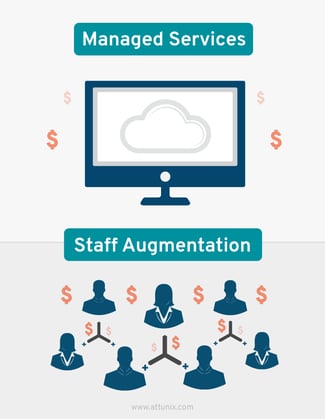Today there are more opportunities for startup businesses than ever before.
Thousands of people use platforms such as Kickstarter to fundraise the capital they need to get their new businesses out of the blocks and racing down the track. That is where most of them fail, though, often within their first year.
Once they can no longer depend on the goodwill donations of others but are earning income based upon their products and services, the training wheels come off, and they discover that it is much more difficult to manage all the ins and outs of business than they thought at first.
There is bookkeeping to keep up with, sales to make, purchases to take care of, inventory to account for, and the biggest hassle of all… customer service. These aspects and many more are the things that keep startup business owners up at night. These are the things that often make or break a company.
When the work outgrows the original startup team, there are two options available: staff augmentation or managed services. How do you choose between managed services vs staff augmentation and what do they have to offer you and your business?
 Staff Augmentation
Staff Augmentation
Pros of Staff Augmentation
Hiring on new staff is the traditional way of handling the increased workload in your company.
There are several ways to get this hiring done, depending upon your need and industry.
- You can put out help-wanted notices in local newspapers, magazines, in your offices, and on your website
- You can also put ads on sites that specialize in connecting employers with prospective workers
- You can reach out to your networks to identify recommended job seekers
LinkedIn has become a networking community for employers to actively seek out and invite others to come work for them. On the other hand, you could seek out a temp agency to find workers for you.
The benefit of hired staff is that you have complete control over job descriptions, work hours, and any other expectations — so long as you can set them at the beginning and have adequate management to ensure they are upheld.
Hiring new staff is a significant investment of time and money, especially if they are full-time, but if you find the right person, you could have a great addition to your business team that will help grow you into the future.
Cons of Staff Augmentation
The challenge of hiring staff is that it is always a bit of a gamble, especially when you do not know them. They could turn out great, but they could just as likely turn out to be people who skip work, do their job sloppily, or bring other baggage into your business that costs you time and money trying to fix, as well as trying to cover the work that they are supposed to be doing. It can be a nightmare and an expensive one at that!
When you consider the costs of insurance, taxes, and all of the other perks of full-time jobs, hiring additional talent is the most expensive option you have for expanding your workforce.
Managed Services
Pros of Managed Services
Managed services have entered into the gap between hiring additional staff and some of the more capable software-based solutions to your business solutions (SaaS).
Managed services providers (MSPs) offer something like temp services for work to be done as opposed to workers to be hired, and usually they do the work remotely. Remote work can actually be a benefit because it means you do not have to provide office space or deal with commute times.
Perhaps even more significant, it vastly broadens the pool of workers you have access to since you are not limited by driving distance, and in some cases, you are not even limited by national boundaries. You have access to some of the best-trained workers in the world through managed services at a price you can afford.
Cost is the second benefit of using managed services vs staff augmentation. Unless you are able to promote and train within the staff you already have, managed services will likely be a less expensive way to get the same work done for your company.
You receive expert work at a fraction of the cost of hired staff because you do not have to worry about benefits or hourly wages in the same way you do with your own employees. Instead, you are contracting with the managed services company for the number of hours and type of work done.
Cons of Managed Services
The one downside of managed services is that you have less control over work expectations and cannot change processes without reworking your contract with the managed services company.
The workers do not work for you, they work for the managed service company, and all work requests must go through them for approval. So long as the work does not change once it is set up, this is not a problem, but for those times when your process or workload varies significantly, it may require alterations with your business arrangement with managed services.
Commitment to Your Company
Commitment to Outcomes with Managed Services
One of the biggest practical differences between managed service and staff augmentation is the kind of commitment that they offer to your company.
Managed service, being a broker of tasks to be accomplished does not focus on hours spent working. They focus on tasks being accomplished. If you hire managed services to redo your company website, then the job will not be done until the website is completed.
They will take the most efficient route to complete that website, even if that means contracting two or three people to get it finished. You are paying for the job to be done though, regardless of who actually does it. This is a commitment to outcomes.
Commitment to Input With Staff
Hired staff, on the other hand, has a commitment to work input. It does matter to them how long it takes to get the job done because, in most cases, they are paid for their time and work effort.
The more time and effort they put in, the more they get paid. It is actually in their own short-term interest to take longer, or put in more work than necessary, to get the job done because they will earn more money that way. This is a commitment to work input.
Making the Decision
Before you make a decision between managed service vs staff augmentation, it is essential that you have the necessary permissions to share work-related data with a third party.
When hiring new employees, some companies require Non-Disclosure Agreements (NDAs) to be signed to prevent leaks of private and/or sensitive information to outside sources. Some companies even have strict requirements about leaving cell phones and other items with cameras or note-taking abilities outside the workplace.
As you can imagine, these regulations are nearly impossible to enforce with remote services where you may or may not even know who is doing the work for you. If you want to avoid costly lawsuits, it is essential to have these conversations upfront and all necessary documents signed by all parties.
Balancing Cost and Control
Beyond legal requirements, the two primary values you need to consider in making your choice of managed service vs staff augmentation are cost and control. These two values work in tandem with one another in the business field.
The more control you want over the work done, the more you will need to pay. While it may be personally attractive to maintain a tight rein on your business, growing companies require leadership that can delegate effectively. The cost of control is not just financial, it involves your time as well.
Every minute you spend handling the customer service or IT department of your company is a minute taken away from research and development, marketing, and other opportunities to grow your company.
However, there may be certain kinds of work that you truly need to keep under control. For these kinds of tasks, it may be more important for you to pay the extra cost of hiring additional staff and retaining that work in-house.
Also, in some cases where the work needed is unique to your company, you may be hard-pressed to find managed service work that can accomplish those tasks as effectively as someone trained within your company.
Choosing The Right Priorities
The real question regarding hiring managed services that you have to ask yourself is this: Are you willing to let go of company maintenance so you can focus on company growth?
If you can pull yourself away from the day to day whirlwind of business and entrust some of these essential services to third parties, it will free your time up for creative ventures and plans for company expansion that will move your business into the future and provide new and greater opportunities for you and your company.
If you have any questions regarding the work expectations or opportunities to connect with your business, be sure to contact your prospective managed service company for the answers you need.














